2025 ARAB AMERICAN BOOK AWARD WINNERS
(Books published in 2024)
WINNERS
| Fiction | We Walked On Thérèse Soukar Chehade (Regal Publishing House) |
| The Evelyn Shakir Non-Fiction Award |
The Land is Holy noam keim (Radix Printing & Publishing Cooperative) Revolution Squared: Tahrir, Political Possibilities, and Counterrevolution in Egypt |
| The George Ellenbogen Poetry Award |
Something About Living Lena Khalaf Tuffaha (University of Akron Press) |
| Children's Literature | A Map for Falasteen Maysa Odeh (Henry Holt and Co./MacMillan) |
HONORABLE MENTIONS
| Non-Fiction | A War of Colors: Graffiti and Street Art in Postwar Beirut Nadine Sinno (University of Texas Press) |
| Poetry | Cue Siwar Masannat (University of Georgia Press) |
| Children's Literature | Kamal’s Key Rifk Ebeid |
WINNERS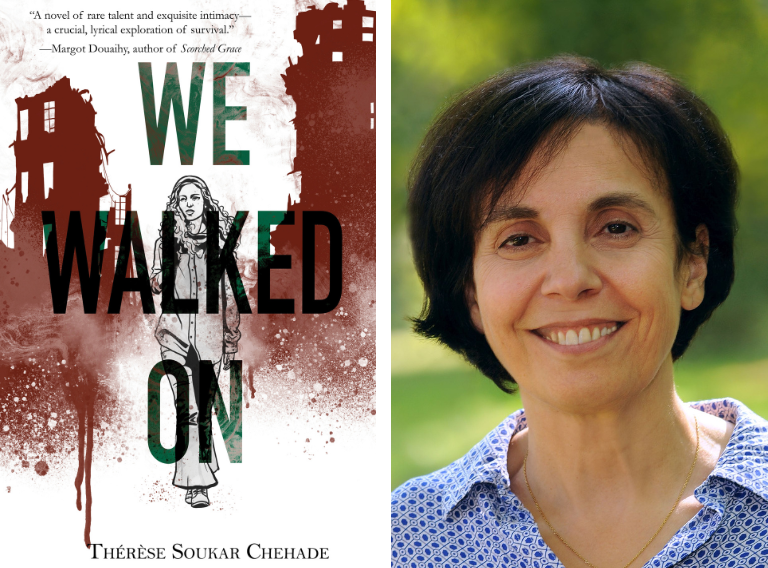
Fiction Award
We Walked On
Thérèse Soukar Chehade
(Regal Publishing House)
Set during Lebanon’s civil war, We Walked On immerses readers in the landscape of war, weaving political unrest into everyday life. With Rita, a fourteen-year-old girl, and Hisham, her thirty-year-old Arabic teacher, Chehade has created two richly drawn characters who counter violence with the redemptive power of books and human connection and find authentic hope in untenable circumstances. We Walked On is a timely novel about what it’s like to live in a war zone, how war corrupts our moral sense, and how to survive and endure in an unjust world.
Born in Beirut, Lebanon, Thérèse Soukar Chehade made her way to Massachusetts in August of 1983, eight years after the start of the Lebanese civil war. Her first novel, Loom, set in rural Vermont, came out in 2010 from Syracuse University Press and won the Arab American Book Award for fiction the following year. Her latest work, We Walked On, published by Regal House Publishing in September 2024, is set against the backdrop of the Lebanese civil war. The novel was a 2022 Noemi Press Prose Award semifinalist and was longlisted for the 2022 Dzanc Prize for Fiction. She still lives in Massachusetts.
The Evelyn Shakir Non-fiction Award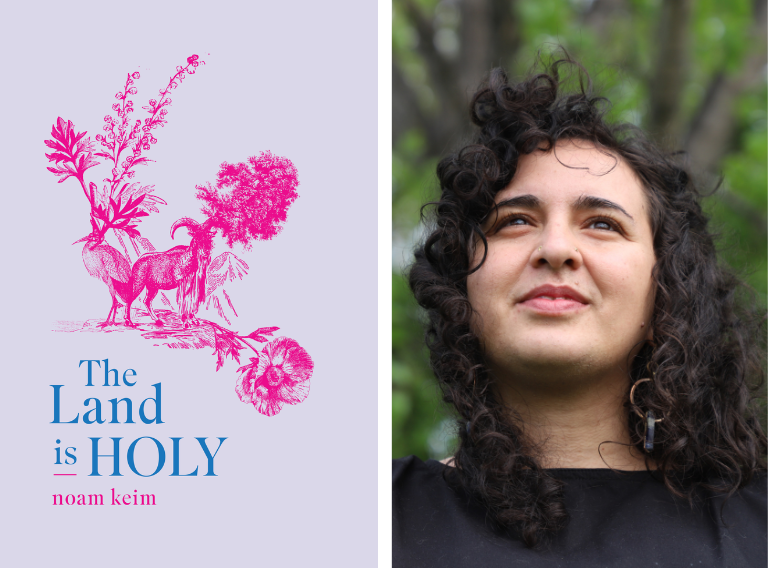
The Land is Holy
noam keim
(Radix Printing & Publishing Cooperative)
The Land is Holy, where natural life is used to glean respite, healing, and stubborn lessons on survival. Home has meant many different things to noam keim. Born a Queer Arab Jew in a settler family in Occupied Palestine, raised in the cobblestone streets of Mulhouse, France; a lifetime of escape across Europe, the foothills of Himalayas in Nepal, Bangkok, and then the makings of a chosen family on Occupied Lenape Land, known as Philadelphia. Through it all, the memory of one’s homes, the persistence of kin persecuted across timelines, their complicity in settler colonialism, and a dogged disavowal of inherited trauma. In this staunchly anti-zionist and abolitionist project, the author considers the wounds of diaspora ache by turning to the fierce primal inhabitants of their lineage for answers. The stork in cyclical rotation, the bitter shiba, the prickly sweet Sabra, the blooming Lindens form larger-than-life metaphors in these essays. Surviving through violent crises and cruel political turns of hand, they are the salve to a world that can be possible with nurture. keim writes, “I want to believe that we carry, in our bodies and bones and blood, the particles of the leaves and flowers that saw our lineages past. Kin.” And in turn they urge us to find kinship with the world that wants us alive and buoyant.
noam keim (they/them) is a trauma worker, medicine maker and flâneur freak. Born a settler of Occupied Palestine in an Arab Jewish family hailing from Morocco, noam grew up in France, first in Mulhouse at the German and Swiss border, before moving to Paris for their studies. After graduating from their masters in American Visual Culture, noam moved to Ann Arbor, Michigan for a fellowship. Many tribulations with immigration later, they now live on stolen Lenni-Lenape land (known as Philadelphia) where they build webs of support for individuals impacted by carceral systems. They believe that their childhood antizionist beliefs is what brought them to their abolitionist practices. Their non-fiction writing weaves themes close to their heart: reverence to the land, healing, queerness, colonialism, plants, abolition. They are a Lambda Literary ’22 Emerging LGBTQ Voices Fellow, a Roots.Wounds.Words ‘23 fellow, a Tin House Winter Workshop ‘23 participant and a Sewanee ’23 contributor. noam was an independent study fellow at POCOAPOCO in Oaxaca and will be an artist-in-residence at Space A in Kathmandu in the Fall of 2023. They are a Periplus ‘23 Fellow mentored by Grace Talusan and their writing as been published by ALOCASIA, Foglifter and others.
The Evelyn Shakir Non-fiction Award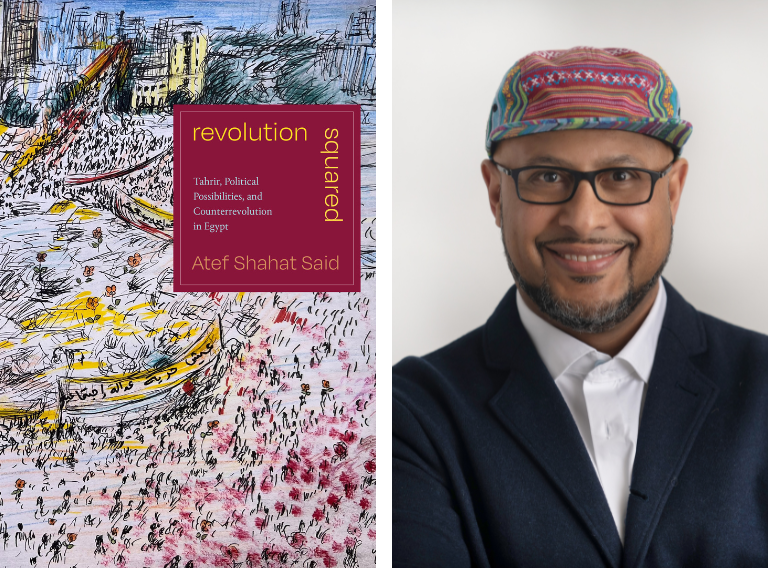
Revolution Squared: Tahrir, Political Possibilities, and Counterrevolution in Egypt
Atef Shahat Said
(Duke University Press)
In Revolution Squared, Atef Shahat Said examines the 2011 Egyptian Revolution to trace the expansive range of liberatory possibilities and containment at the heart of every revolution. Drawing on historical analysis and his own participation in the revolution, Said outlines the importance of Tahrir Square and other physical spaces as well as the role of social media and digital spaces. He develops the notion of lived contingency—the ways revolutionary actors practice and experience the revolution in terms of the actions they do or do not take—to show how Egyptians made sense of what was possible during the revolution. Said charts the lived contingencies of Egyptian revolutionaries from the decade prior to the revolution’s outbreak to its peak and the so-called transition to democracy to the 2013 military coup into the present. Contrary to retrospective accounts and counterrevolutionary thought, Said argues that the Egyptian Revolution was not doomed to defeat. Rather, he demonstrates that Egyptians did not fully grasp their immense clout and that limited reformist demands reduced the revolution’s potential for transformation.
Atef Shahat Said is Assistant Professor of Sociology at the University of Illinois at Chicago and the author of two books in Arabic.
The George Ellenbogen Poetry Award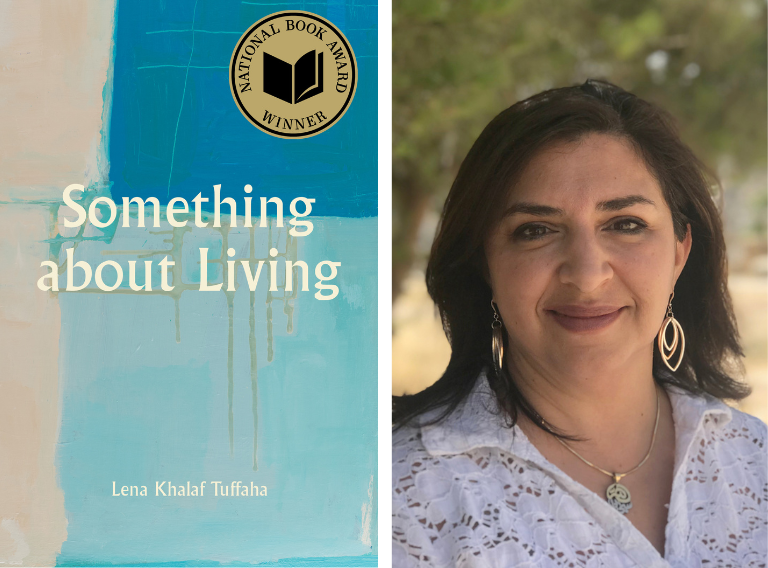
Something About Living Lena Khalaf Tuffaha
(University of Akron Press)
Something About Living explores Palestinian life through the lens of American language, revealing a legacy of obfuscation and erasure. What happens when language only permits ongoing disasters to be packaged neatly for consumption and subsequent disposal?
Lena Khalaf Tuffaha is a poet, essayist and translator. She is author of three books of poetry: Something About Living (University of Akron Press, 2024), winner of the 2024 National Book Award for Poetry and the 2022 Akron Poetry Prize; Kaan & Her Sisters (Trio House Press), finalist for the 2024 Firecracker Award and honorable mention for the 2024 Arab American Book Award; and Water & Salt (Red Hen), winner of the 2018 Washington State Book Award and honorable mention of the 2018 Arab American Book Award. She is also the author of two chapbooks, Arab in Newsland, winner of the 2016 Two Sylvias Prize, and Letters from the Interior (Diode, 2019), finalist for the 2020 Jean Pedrick Chapbook Prize. For more about her work, visit www.lenakhalaftuffaha.com
Children's Award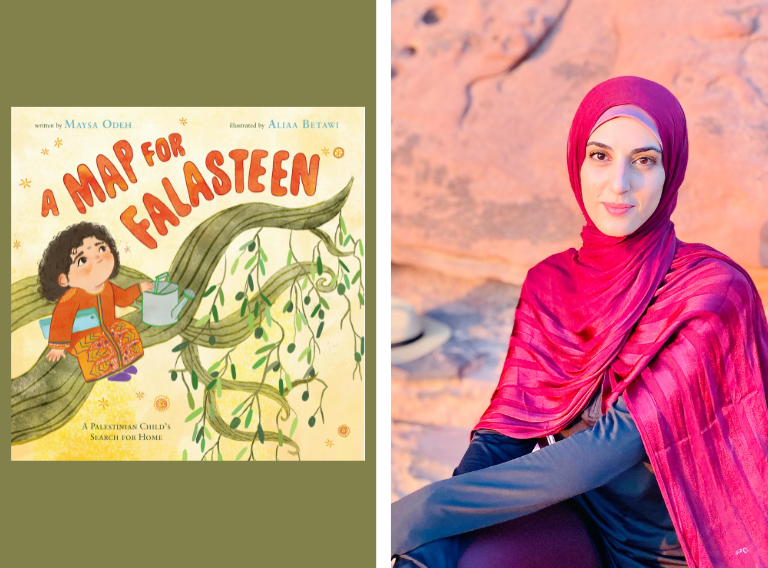
A Map for Falasteen
Maysa Odeh
(Henry Holt and Co./MacMillan)
A young Palestinian girl living in diaspora struggles to find her homeland on a map in this gentle and heartfelt picture book. At school, Falasteen and her classmates are tasked with finding their families' home countries on a map, but no matter how hard she looks, Falasteen can't find Palestine. Can a place exist if it's not on a map? Confused, Falasteen turns to her family for answers. Her grandfather, grandmother, and Mama encourage her to see their homeland from a different perspective, and each of their stories helps her understand her people's history and her own place in the world. Filled with beautiful, inspiring illustrations and thoughtful back matter that outlines key terms and historical moments, this is a story of family, resilience and home always being where the heart is.
Maysa Odeh is a Palestinian writer who grew up between Amman, Jordan and the United States. Her debut picture book was written during the assault on Gaza in 2021, which sparked a conversation between herself and her inner child. A Map for Falasteen answers the questions she was too shy to ask as a child of Palestinian refugees. Maysa resides in California with her four year old daughter, Malak, who asks questions all day long in Arabic and English, and sometimes even in her sleep.
HONORABLE MENTIONS
Non-Fiction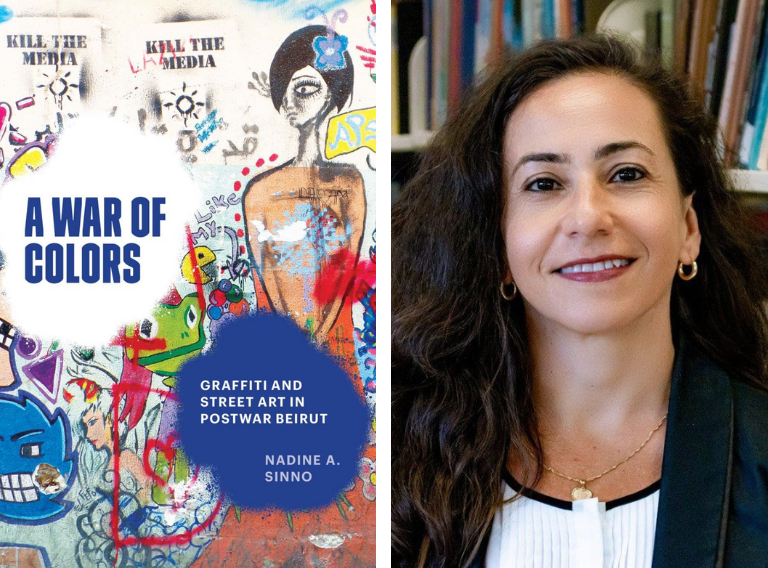
A War of Colors: Graffiti and Street Art in Postwar Beirut
Nadine Sinno
(University of Texas Press)
Over the last two decades in Beirut, graffiti makers have engaged in a fierce “war of colors,” seeking to disrupt and transform the city’s physical and social spaces. In A War of Colors, Nadine Sinno examines how graffiti and street art have been used in postwar Beirut to comment on the rapidly changing social dynamics of the country and region. Analyzing how graffiti makers can reclaim and transform cityscapes that were damaged or monopolized by militias during the war, Sinno explores graffiti’s other roles, including forging civic engagement, commemorating cultural icons, protesting political corruption and environmental violence, and animating resistance. In addition, she argues that graffiti making can offer voices to those who are often marginalized, especially women and LGBTQ people. Copiously illustrated with images of graffiti and street art, A War of Colors is a visually captivating and thought-provoking journey through Beirut, where local and global discourses intersect on both scarred and polished walls in the city.
Nadine A. Sinno is an associate professor of Arabic and director of the Arabic Program at Virginia Tech, as well as a literary translator. She is the coauthor of Constructions of Masculinity in the Middle East and North Africa.
Poetry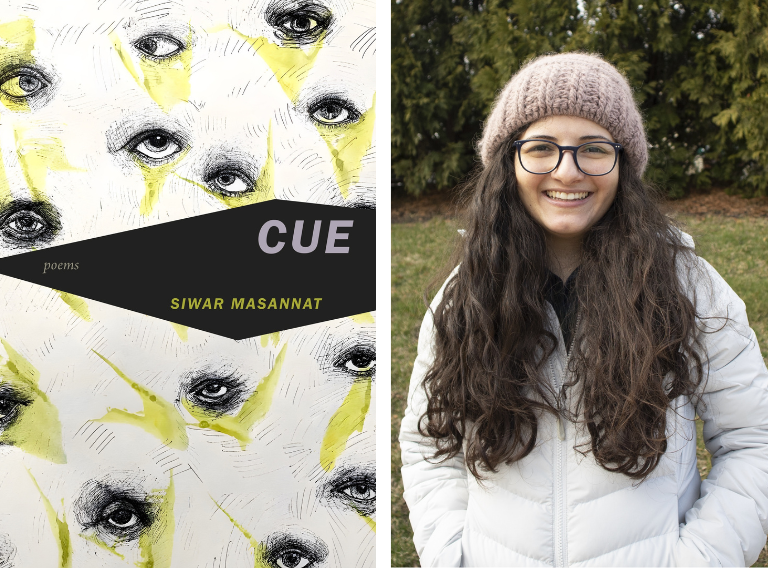
Cue
Siwar Masannat
(University of Georgia Press)
A Jordanian poet considers the cultural nuances of the private-versus-public paradox
With cue, Siwar Masannat follows up her prize-winning debut with poems that wrestle with intimacy and distance. Departing from love as a force of creation, cue’s intertextual experiments and lyric poems map environmental relations and pose questions about privacy and visibility, love and family, gender, and ecological agency. Masannat responds to artist Akram Zaatari’s excavation of studio portraits by Hashem El Madani. Captured between the 1940s and 1970s in the Lebanese town of Saida, El Madani’s photographs are living artifacts of a transnational modernity. They archive performances of gender and romance that seek to circumvent respectability politics. The private-public, then, emerges as a paradox at the heart of cue’s composition. The desire to commune with and re-transmit the photographs and their stories is accompanied by the speaker’s understanding of how visibility may be coopted and how privacy, at once essential and weaponized, is unevenly enjoyed, opportunistically deployed, and systematically encroached upon.
Siwar Masannat is a Jordanian writer. 50 Water Dreams, her debut collection of poetry, was selected by Ilya Kaminsky as the winner of the Cleveland State University Poetry Center’s First Book Competition and published in 2015. Managing Editor of the African Poetry Book Fund and Prairie Schooner, Masannat currently works at the University of Nebraska in Lincoln. Most recently, Masannat’s writing appeared in Mïtra: Revue d'art et de littérature, 7iber, Fence, and Lana Turner: A Journal of Poetry and Opinion, among others.
Children's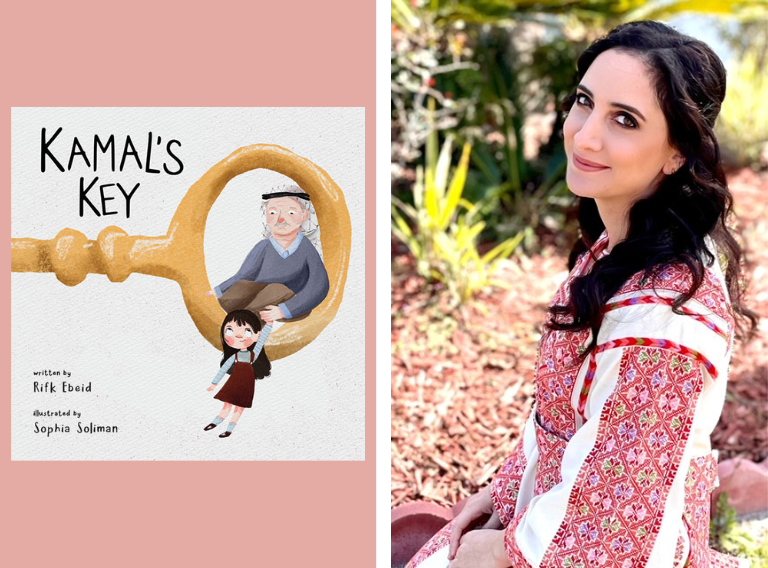
Kamal’s Key
Rifk Ebeid
A multigenerational and empowering story that explores the resilience of the human spirit to persist through life's most difficult challenges, using the powerful symbolism that the key has come to represent in the Palestinian cause for freedom and justice.
Rifk Ebeid is a Palestinian American Muslim writer, attorney and pediatric speech language pathologist. She is the author of four children's picture books about Palestine, including Baba, What Does My Name Mean? A Journey To Palestine, You Are the Color, Birthday Kunafa, and Kamal's Key. She is also the producer of I Am From Palestine, an award-winning animated short film about the Palestinian American experience in school. Ebeid has a JD from George Mason University School of Law, an MA in Human Rights Studies from Columbia University, an MA in Speech-Language Pathology from the University of Northern Colorado, and a BA in Political Science and Near Eastern Languages and Cultures from the University of Florida.
